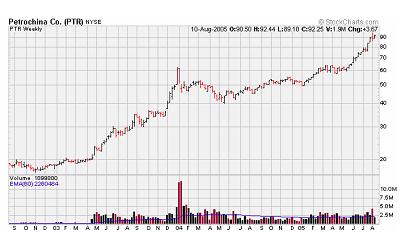
The stock market is in one, and I'm starting to get that funny tickling feeling in the back of my neck. Starting, but not quite there yet. Why is the stock market in a weird state? Because stock price growth follows economic growth, and the American economy is set to grow less than two percent this year and maybe slightly more next year (nobody knows for sure of course), yet certain portions of the market are being bid up like there's no tomorrow. That puts it out of kilter. What goes up must come down.
Then there's the China factor. A friend remarked to me the other day that China is to the US of today as the US of the Twenties was to the United Kingdom. There's a lot of truth in that in many ways, but let's focus for a moment on financial assets. In February, you may recall, the Shanghai stockmarket plunged 9%, causing a massive selloff on Wall Street. Since then, it has rocketed back up 45%. As Crossing Wall Street says, we all know how this story ends. At least, we know how it ended in the Twenties.
Then there is the Europe factor. A recent survey by Merrill Lynch indicated that most money-managers are overweight in Europe. What most big money managers have already done is a fairly reliable counterindicator. It may be that European stocks, which have done very well for the last couple of years are getting frothy.
Then there is the Microsoft factor. It paid $6 billion for aQuantive the other day. That amounts to $2.85 million for each of the employees. At that price, it could have hired 60,000 new engineers and managers at 100k each and practically doubled its size. This seems a little over the top, exactly the kind of buying panic we typically see at market tops.
So what is driving the market relentlessly upward if not the economy? As I posted in November, there's a huge amount of cash sloshing around the world. The rich have indeed been getting richer by leaps and bounds for the last quarter century, and many of the middle classes have moved into the ranks of the rich. With inflation relatively low, with housing prices in all the desirable locations higher than a cat's back, with two Beamers already sitting in the garage, what are you going to do with it? As I read back in the late Nineties, the economic purpose of a stock market crash is to remove excess capital from the system.
Finally, is our ability to extract cheap oil about to peak? How would a rational stock market react to that?
But if you're not worried, here are ten red hot Chinese stocks (little joke, that) to invest in now.
1 comment:
great post--will read closer as soon as i buy them chinese stocks--be right back--
Post a Comment